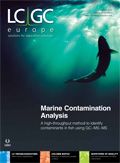HPLC 2015 — The 42nd International Symposium on High Performance Liquid Phase Separations and Related Techniques
HPLC 2015 - The 42nd International Symposium on High Performance Liquid Phase Separations and Related Techniques
HPLC 2015 - The 42nd International Symposium on High Performance Liquid Phase Separations and Related Techniques - will be held from 21–25 June at the International Conference Center (CICG) in Geneva, Switzerland, hosted by the Division Analytical Sciences of the Swiss Chemical Society. Separation science, and liquid chromatography (LC) in particular, plays a key role in a number of fields including environmental science food science, systems biology, medicine, bioanalysis, and quality control. Exciting new developments in hardware and fundamentals, miniaturization, multidimensional separations, sample preparation, and mass spectrometric (MS) detection have become key topics in the field. To cover all of these aspects, the conference will be organized around three main parallel sessions covering: 1) Core Separation Technology: Understanding the Fundamentals to Drive Innovation; 2) Hyphenated and Multidimensional Separations: Multidimensional LC, Mass Spectrometry, and Related Detection Methods; and 3) High Impact Sample Preparation Separation and Detection: On the Edge of Current and Future Applications. A fourth session will be dedicated to tutorials and short oral contributions (5 min) from selected posters.
Leading scientists from all over the world will present exciting and motivating plenary, keynotes, and tutorial lectures. Selected speakers include: Robert Kennedy (University of Michigan, USA); Peter Jenny (CERN, Geneva, Switzerland); Jack Henion (Ithaca, NY, USA); Ruedi Aebersold (ETHZ, Zürich, Switzerland); Mary J. Wirth (University of Purdue, USA); Peter Schoenmakers (University of Amsterdam, The Netherlands); Emily Hilder (University of Tasmania, Australia); Guowang Xu (University of Dalian, China); Luigi Mondello (University of Messina, Italy); and Thomas Hankemeier (University of Leiden, The Netherlands). A special session will be dedicated to the late Georges Guiochon to pay respect and honour his lifelong contributions to separation science.
Beside a strong scientific programme the conference will hold a large instrumentation, software, and consumables exhibition. Attendees will also have the opportunity to participate in lunchtime seminars to learn the latest developments from the exhibitors. One-day short courses will also be offered on Sunday 21 June 2015. A significant amount of time will be dedicated to the poster sessions where the participants can present their latest results and interact face-to-face with scientists from all over the world.
The conference will also recognize the contributions of young scientists with the Csaba Horváth Award that honours the memory of Csaba Horváth and recognizes his contributions to HPLC. Travel awards are available from the conference organizers as well as from various supporting scientific organizations and young scientists are encouraged to apply. High level scientific contributions that will be awarded during the conference include: the Widmer-Simon Award, the Uwe D. Neue Award, and the ChromSoc Award.
An exciting social programme awaits the participants. Geneva is easily accessible from all major European cities and offers a wide range of accommodation for different budgets. HPLC 2015 in Geneva will offer a unique event to present the latest developments in fundamentals and applications in the separation sciences, stimulating scientific exchanges, synergies, and cooperation in a friendly environment. The poster submission deadline is open until 1 April 2015.
Chair Person: Gérard Hopfgartner
E-mail: hplc2015@symporg.chWebsite: www.hplc2015-geneva.org
8–12 March 2015
Pittcon 2015
Ernest N. Morial Convention Center, New Orleans, Louisiana, USA
Contact: Marian Nardozzi
Tel: +1 412 8253220 ext: 203
E-mail: publicity@pittcon.orgWebsite: www.pittcon.org/register
18–20 March 2015
17th International Trade Fair of Analytical Measurement and Control Technology (Eurolab 2015)
Trade Fair and Congress Centre MT Polska, Warsaw, Poland
Tel: +22 529 39 00 / 50
E-mail: recepcja@mttargi.plWebsite: www.mttargi.pl
30 June–3 July 2015
21st International Symposium on Separation Sciences (ISSS 2015)
Ljubljana, Slovenia
Organizers: Slovenian Chemical Society in association with the National Institute of Chemistry and the Faculty of Chemistry and Chemical Technology, Ljubljana, Slovenia
Tel: +386 1 4760 265
E-mail: info@isss2015.siWebsite: www.isss2015.si
3–6 November 2015
Recent Advances in Food Analysis (RAFA)
Clarion Congress Hotel, Prague, Czech Republic
Tel: +386 1 4760 265
E-mail: rafa2015@vscht.cz.
Website: www.rafa2015.eu
18–19 November 2015PEFTEC International Conference and Exhibition for Petrochemical Analysis
Antwerp Exhibition Centre, Antwerp, Belgium
Tel: +44 1727 858840
E-mail: info@peftec.comWebsite: www.peftec.com
Please send any event news to Bethany Degg bdegg@advanstar.com


















Regulatory Deadlines and Supply Chain Challenges Take Center Stage in Nitrosamine Discussion
April 10th 2025During an LCGC International peer exchange, Aloka Srinivasan, Mayank Bhanti, and Amber Burch discussed the regulatory deadlines and supply chain challenges that come with nitrosamine analysis.
Regulatory Deadlines and Supply Chain Challenges Take Center Stage in Nitrosamine Discussion
April 10th 2025During an LCGC International peer exchange, Aloka Srinivasan, Mayank Bhanti, and Amber Burch discussed the regulatory deadlines and supply chain challenges that come with nitrosamine analysis.
